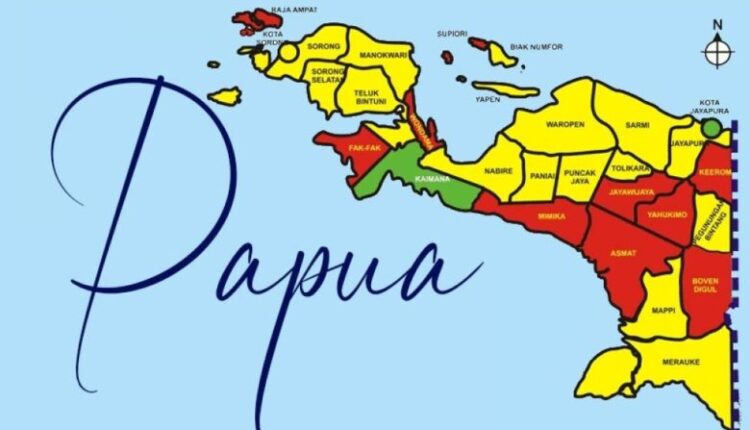NKRI Affirms, Papuan Independence is Just an Illusion
By: Frans Devaryo)*
Papua’s status as an integral territory of the Unitary State of the Republic of Indonesia (NKRI) is final and valid under international law. As an integral part of Indonesia, if we talk about Papua, we will show a long journey towards unity and diversity which is the basis of this country.
Commander of Kodam (Pangdam) XVII/Cenderawasih, Major General Izak Pangemanan emphasized that the land of Papua is an inseparable part of the Republic of Indonesia. Therefore, as all children of the nation who are fighting together to advance Indonesia, we are obliged to work together to maintain security in the Land of Papua.
According to him, Bumi Cenderawasih, which contains six provinces, is an inseparable part of the Republic of Indonesia. So what has been expressed by certain groups cannot be accounted for.
The United Nations (UN) closed the decolonization of Papua on May 1 1963. In this way, the easternmost region of Indonesia is an inseparable part of the Republic of Indonesia. Because of this, his party invites the public to no longer trust certain groups that are still trying to separate Papua from the Republic of Indonesia. Activities involving the issue of ‘Free Papua’ carried out by a group of people are only for their personal and group interests.
Previously, there was chaos when the body of former Papuan governor Lukas Enembe was taken to Koya Tengah, Jayapura City from Sentani, Jayapura Regency, which is about 50 kilometers away. According to Izak, there were acts of throwing and burning which were masterminded by KNPB and ULMWP members who infiltrated the mourners who were walking. They deliberately create chaos and create terror to cause anxiety in society. This step is an effort by the KNPB and ULMWP to show their existence in Papua. They want to get the attention and sympathy of the community’s support for voicing Papuan independence. In fact, Papua’s status is final and binding as part of the Republic of Indonesia.
The Central Government itself also emphasized that it would never hold negotiations with KST Papua regarding their request to liberate Bumi Cenderawasih from the Republic of Indonesia. Not only does it continue to defend the territory in the Land of Papua, but the government is also fully committed to being able to eradicate any party that wants to take even a small part of this nation.
In fact, discussing the history of Papua in the context of de jure (law) and de facto (real conditions) is important to understand its position as an inseparable part of Indonesia. De jure, Papua has been part of Indonesia since the Round Table Conference (KMB) in 1949. At the KMB, the Dutch recognized Indonesia’s sovereignty, including the West Irian region (now Papua). However, the Dutch then denied this recognition and tried to make West Irian a separate puppet state.
To overcome this, Indonesia has made various efforts, including through diplomacy and confrontation. In the end, Indonesia succeeded in seizing West Irian from the Dutch through Operation Trikora in 1962. Furthermore, in 1969, a Popular Opinion Determination (Pepera) was held which was attended by 1,024 Papuans who were elected to represent all Papuan people. In this Pepera, as many as 1,024 Papuans declared by acclamation to join Indonesia.
Since then, Papua has become a province of Indonesia with all the rights and obligations attached to provincial status. The formation of the 1945 Constitution also outlined the sovereignty and territorial integrity of Indonesia, including Papua, as an inseparable part of the country.
De facto, Papua has been part of Indonesia for a long time. Since ancient times, Papua has had relations with other parts of Indonesia, especially with Maluku. This is proven by the existence of various cultural, economic and social ties between Papua and other regions of Indonesia.
Member of Commission I DPRRI, TB Hasanuddin, said that Papua’s status as part of the Republic of Indonesia itself was a fixed price that could no longer be negotiated. Therefore, the existence of Papuan independence demanded by separatist groups in their various actions is certainly unacceptable and must be dealt with firmly by security forces. Because it has violated historically clear rules and agreements. For this reason, the government will absolutely never respond to negotiations related to the unitary territory of the Republic of Indonesia only for the interests of a few people. The various actions carried out by terrorist groups in Papua cannot in any way represent the problems in Bumi Cenderawasih, but only a handful of certain groups.
Even though the government continues to make various efforts to advance Papua and integrate it into state structures, the issue of separatism still arises from time to time. A deep understanding of the root causes of this issue is necessary to create a sustainable solution.
Handling the issue of Papuan separatism requires a holistic approach. Education, dialogue, discussion and empowerment of local communities are the keys to building a strong understanding of Indonesia’s diversity. In this context, community participation, including community leaders, traditional leaders and religious leaders, will be very important to reach an inclusive agreement.
Therefore, the serious commitment of the Indonesian government regarding advancing Papua is proof that the easternmost region is its identity and identity. which enriches the diversity of the nation. Papua has become an inseparable part of Indonesia, both de jure and de facto. Through development and mutual understanding, as well as sustainable development in Papua is the key to ensuring justice and prosperity for all Indonesian people, including our brothers and sisters in Papua.
In an effort to build a more developed Papua, it is important for all of us to continue to strengthen unity, respect diversity and maintain the integrity of the Indonesian state. Papua is not only part of the map, but also part of our soul and identity as a nation.
)* The author is a Papuan student who lives in Semarang
